Do all isotopes of an element have the same atomic number?
3 Answers
Yes, absolutely. Because, by definition, the element hydrogen is defined by
Explanation:
If there is 1 positively charged particle in the atomic nucleus, 1 proton, then we have the element hydrogen; if 2, then helium; if 23, then vanadium etc.
The atomic number,
It is important to understand these principles; they are basic and fundamental. Don't be backward in coming forward if you have an objection or query.
So the most important factoid: the atomic number determines elemental identity! Note that for all the Chemistry exams you will ever sit, you will and MUST be issued a Periodic Table, which will give you the average isotopic mass.
All atoms of the same element have the same atomic number.
Explanation:
The atomic number of an element is the number of protons in the nuclei of its atoms. All atoms of an element have the same atomic number. All isotopes of the same element, such as hydrogen, have the same number of protons (same atomic number) but different numbers of neutrons in their nuclei.
There are three isotopes of hydrogen; hydrogen-1, hydrogen-2, and hydrogen-3. The atomic number of hydrogen is 1. The atoms of hydrogen-1 have 1 proton and 0 neutrons in their nuclei, the atoms of hydrogen-2 have 1 proton and 1 neutron in their nuclei, and atoms of hydrogen-3 have 1 proton and 2 neutrons in their nuclei. Notice that all of the hydrogen isotopes have the same number of protons in their nuclei, regardless of the number of neutrons. Therefore, they all have the same atomic number, which, according to the periodic table, is 1.
Yes
Explanation:
An isotope of an element is just that same element but with a different number of neutrons, therefore different atomic mass.
A normal hydrogen atom has a mass of
Isotopes of hydrogen include deuterium and tritium, which are hydrogen-
Note that they are still the same element, as the atomic (proton) number is responsible on what element is currently there. It doesn't matter if we somehow create



